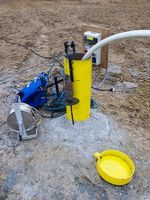
If your home depends on a water well, your supply must be free of potentially harmful contaminants for your family’s health and safety. With more than 15 million American homes counting on wells for clean water, you should understand the potential risks.
5 Contaminants Commonly Affecting Water Wells
1. Microbiological Contaminants
Microorganisms such as E. coli, Giardia, and Cryptosporidium are natural inhabitants of the environment. Proliferating in soil contaminated by human and animal waste, they migrate from runoff and underground tanks through the subsoil and into subterranean aquifers. Potential health risks range from dysentery and hepatitis to cholera and typhoid.
2. Heavy Metals
Metallic elements like chromium, lead, selenium, arsenic, and copper are common byproducts of manufacturing. Potentially damaging the kidneys and liver, these metals also trigger gastrointestinal problems. If you source your groundwater in proximity to industrial operations, it may be at risk. Copper and lead may also cause contamination due to outdated plumbing serving the well.
 3. Radionuclides
3. Radionuclides
Also known as radiologicals, ongoing exposure to these radioactive elements has a connection to cancer. Areas with granite bedrock often harbor radionuclides like radium, uranium, and radon that leech into the water during mining. Human-made contamination includes waste from gas, oil, and coal production as well as byproducts from medical facilities, fertilizer manufacturing, and nuclear power.
4. Fluoride
Flouride is famous for its protective properties against tooth decay. It’s detectable in almost all water and is rarely a health risk. However, you should test your well water regularly to ensure it doesn’t exceed safe levels for consumption. Prolonged exposure to high fluoride levels may cause damaged, discolored teeth, as well as a painful skeletal condition called fluorosis.
5. Nitrates
Nitrates are compounds associated with industrial activity, animal waste, fertilizer, sewage, and septic systems. Exposure to water contaminated by nitrates is likely due to seepage and runoff. High levels have a link to methemoglobinemia, or “blue baby disease,” a potentially fatal condition that reduces the blood’s capacity to carry oxygen. It poses a severe risk to pregnant women, babies, and people with weakened immune systems. Older adults and individuals with chronic lung, cardiac, and blood conditions should also remain vigilant.
If you have concerns about the safety of your water well, you should take action. The experts at Walles Pump Service in Clever, MO, are third-generation professionals devoted to ensuring the quality of family water supplies throughout Southeast Missouri for more than 20 years. From testing to pump maintenance, repair, and installation, their Better Business Bureau® A+-rated work exceeds expectations at reasonable rates. Call (417) 369-3801 to consult a specialist or visit their website for more information about their services.
About the Business
Have a question? Ask the experts!
Send your question

